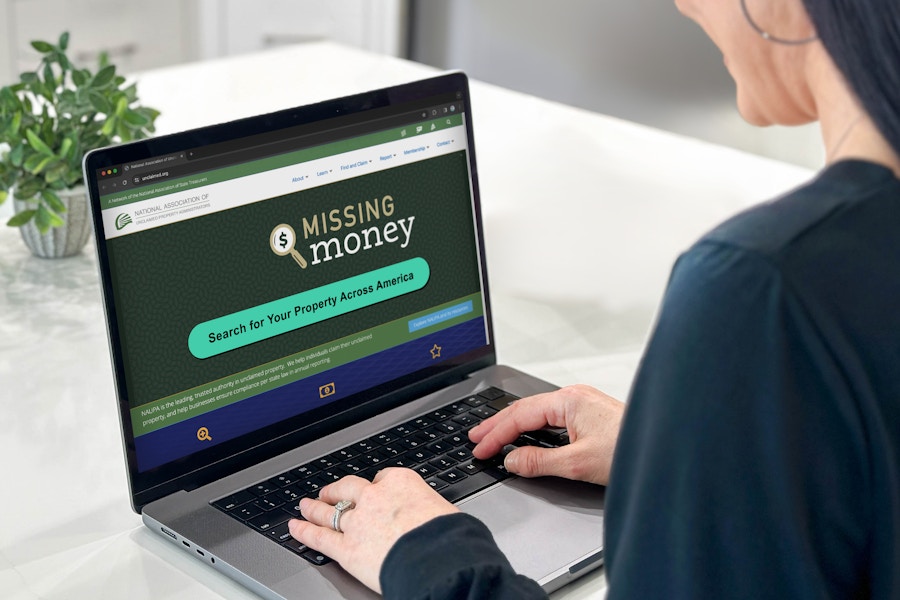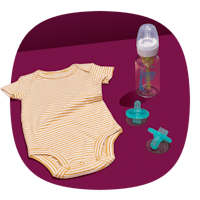I get giddy when I find a measly $5 bill in my pocket. Imagine my excitement when my brother called to tell me how to find unclaimed money (after he found $3,000!). Unclaimed money could be hundreds or even thousands of dollars that you didn’t know you had, just floating around out there. Yep. This really is a thing. And with prices continuing to rise on things like eggs, I want to grab any cash owed to me.
The National Association of Unclaimed Property Administrators (NAUPA) says one in seven people have unclaimed funds out there — $33B in stock dividends, forgotten bank accounts, utility company deposits, and safe deposit box contents. If you want to go on your own treasure hunt for unclaimed funds, then read on. It’s free, easy, and better than looking for loose change in your sofa. (For the record, I didn’t find any unclaimed money, but you might.)
Download the Krazy Coupon Lady app for money-saving hacks to save you big bucks over time.
1. Visit the unclaimed money website for your state’s controller or treasurer’s office.

Visit NAUPA’s Unclaimed.org website and click on your state. Then follow the link to search for unclaimed property in your home state. Don’t limit your search to your current state’s database, though. Check every state’s database where you have ever lived. There is also MissingMoney.com, which is a broader database that lists all of the states where you might have unclaimed money. But because it covers all of the states and provinces, it’s a little overwhelming and harder to navigate (in my opinion) than simply going to the pages of the states in which you have lived.
2. Enter your name or your business’s name on your state’s unclaimed property website.
Your legal name is just the beginning. Try out different variations of your name (e.g., Tammy Jane Smith, Tammy Smith, and T.J. Smith), and if you’re married, search under your maiden name.
3. File an unclaimed money property claim.
If your state’s unclaimed property website lists an unclaimed account that you think is yours, you have to file a claim. But don’t stress. Your state’s website should provide detailed instructions; usually just a digital form you fill out with your driver’s license, social security number, etc.
Related: How to Spend Less Money—100 Ways to Start
4. Be patient: It can take months for your state to pay you.
There is no time limit for filing since each state maintains unclaimed assets in trust forever. Since they aren’t in a hurry, be prepared to wait.
5. Be careful. Some shady companies offer to find your unclaimed money for a fee.
Most of these private companies are legal, but they’re providing a service you can do on your own for free. So pass.
Even worse, some scam artists run unclaimed property schemes through spam emails telling people they have millions of dollars in unclaimed funds. The scam emails look legit, even like they come from NAUPA. When you see these, delete and don’t open them!
If you have unclaimed money, trust me, nobody will contact you. You gotta look for it.
Best websites to find unclaimed money owed you:
Unclaimed.org
Like I mentioned above, The National Association of Unclaimed Property Administrators (NAUPA) runs Unclaimed.org.
MissingMoney.com
Missing Money is another great state-by-state site where you can search for unclaimed funds from bank accounts, escrow, uncashed paychecks, insurance policies, and trust funds.
Internal Revenue Service (IRS)
That’s right—there’s actually a chance the Internal Revenue Service might owe you money for once. According to the National Taxpayers Union (NTU), every year taxpayers fail to claim more than $150 million dollars in tax refunds.
U.S. Treasury Department
The U.S. Treasury Department is in charge of the government’s savings bond program, so they administer payouts when bonds mature. But, if they can’t find a bondholder, the cash remains unclaimed—unless the bondholder decides to be proactive and looks for the missing money!
USA.gov
At USA.gov, you can search several government databases, including money you may have from bank failures, investments, and bankruptcies,
National Association of Insurance Commissioners (NAIC)
If you think you might have a life insurance policy out there that you never claimed for a deceased family member, you can research it through the NAIC.
That’s all I got. But if you have more or want to share the wealth, drop a comment and hook us up!
































Tell us what you think